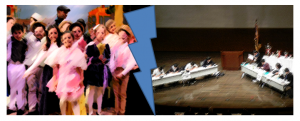In his 2011 book Creative Thinkering, Michael Michalko explains the idea of conceptual blending. What you do is take dissimilar objects or subjects and then blend them–that is, force a conceptual connection between them by comparing and contrasting features. It’s an enlightening little mental activity that can help you to come up with creative ideas or insights as you think about how the features of one thing could possibly be manifested in another. In the past few days, I’ve tried blending two activities that I’ve seen push EFL improvement more than any other: performance in club-produced musicals, and competitive policy debating. I’ve compared them with each other and with regular classroom settings,
I chose these two because over the last few years I have seen drama and debate produce language improvements that go off the charts. This improvement can be explained partly in terms of the hours on task that both of these activities require and the fact that students elect to take part voluntarily, but I don’t think that explains everything. There are certainly other possible factors: both require playing roles; both are team activities; both have performance pressure; both reward accomplishment; both require multi-modal language use and genre transformation; both require attention to meaning and form; both are complex skills that require repeated, intensive practice to achieve, and that practice is strictly monitored by everyone involved, who then give repeated formative feedback. Not complete, but not a bad list, I thought.
But then while reading Leaders of Their Own Learning, a wonderful sort of new book by Ron Berger, Leah Rugen, and Libby Woodfin, I came across this quote by a principal of a middle school in the US:
“Anytime you make the work public, set the bar high, and are transparent about the steps to make a high-quality product, kids will deliver.”
I think the speaker hit the nail on the head as to why activities like debate and drama work: public, high expectations, and clear steps. Aha: public! The dominant feature of debate and drama is that there is a public performance element to them. Students prepare, keenly aware that they will be onstage at some point; they will be in the spotlight and they will be evaluated. Of course students need support and scaffolding and lots of practice before they can get on stage, but unless there is a stage, everything else won’t matter as much. It is the driver of drivers. Is that pressure this message suggests? Yup, but also purpose. I have seen kids transformed by the experiences of competitive debating or performing in a musical. I refuse to believe that the mediocrity I see in so many language course and programs is the way it has to be.
So, to get back to the whole reason for this little thought experiment: how can we take these best features of debate and drama and apply them to language programs? The key, I hope you will agree, is introducing a public performance element. There needs to be some kind of public element that encompasses a broad range of knowledge, skills, and micro-skills, and then there needs to be sufficient teaching, scaffolding, and practice to ensure public success. But how…?
Over the next few blog posts, I’ll be exploring these issues, drawing from ideas that are being developed in K-12 education in the US, particularly in approaches that have been working in high-challenge schools with English language learners and other at-risk learners (for example, by Expeditionary Learning, WestEd, and Uncommon Schools). In particular, I’ll be looking at ideas in Leaders of Their Own Learning (mentioned and linked above), Scaffolding the Academic Success of English Language Learners, by Walqui and Van Lier, and the soon-to-be-released second edition of Teach Like a Champion 2.0 by Doug Lemov. I’ll be looking at all of these through the lens of an EFL teacher in Japan. Many things in these books won’t be applicable in my context, but I suspect many may help inform ways of improvement here.
